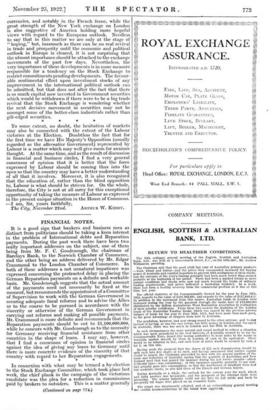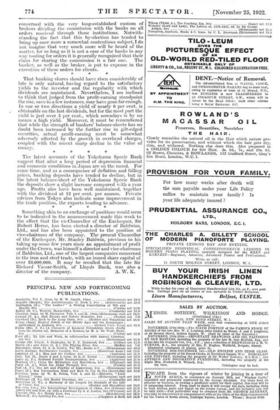FINANCIAL NOTES.
It is a good sign that bankers and business men as distinct from politicians should be taking a keen interest in the problem of International debts and Reparation payments. During the past week there have been two really important addresses on the subject, one of them being from Mr. F. C. Goodenough, the chairman of Barclays Bank, to the Norwich Chamber of Commerce, and the other being an address delivered by Mr. Edgar Crammond to the London Chamber of Commerce. In both of these addresses a not unnatural impatience was expressed concerning the protracted delay in placing the German Reparation payments on a definite and workable basis. Mr. Goodenough suggests that the actual amount of the payments need not necessarily be fixed at the moment, but recommends the appointment of a Committee of Supervision to work with the German Government in securing adequate fiscal reforms and to advise the Allies as to the course to be pursued in accordance with the sincerity or otherwise of the German Government in carrying out reforms and making all possible payments. Mr. Crammond is more definite and recommends that the Reparation payments should be cut to £1,100,000,000, while he concurs with Mr. Goodenough as to the necessity for Germany receiving financial assistance from other countries in the shape of loans. I may say, however, that I find a consensus of opinion in financial circles against the idea of giving any loans to Germany until there is more concrete evidence of the sincerity of that country with regard to her Reparation engagements.
* *
In connexion with what may be termed a by-election to the Stock Exchange Committee, which took place last week, the chief plank in the campaign of the victorious candidate was the plea for a reduction in commissions paid by brokers to outsiders. This is a matter generally
(Continued on page 774.) concerned with the very long-established custom of brokers dividing the commission with the banks on all orders received through those institutions. Notwith- standing the fact that this by-election has tended to bring up once more a somewhat contentious subject, I do not imagine that very much more will be heard of the matter, for so long as it is not a case of the banks in any way touting for orders it is generally recognized that their claim for sharing the commission is a fair one. The hanker, as well as the broker, is put to expense in the execution of these orders for clients.
That banking shares should have risen considerably of late is only natural, having regard to the satisfactory yields to the investor and the regularity with which dividends are maintained. Nevertheless, I am inclined to think that judged from the profit-earning standpoint the rise, save in a few instances, may have gone far enough. In one or two directions a yield of nearly 6 per cent. is • obtainable on the last dividends, but for the most part the yield is just over 5 per cent., which nowadays is by no means a high yield. Moreover, it must be remembered that while the strength of bankers' balance-sheets has no doubt been increased by the further rise in gilt-edged securities, actual profit-earning must be somewhat adversely affected by the growth in overhead charges, coupled with the recent sharp decline in the value of money. * * * * The latest accounts of the Yokohama Specie Bank suggest that after a long period of depression financial and economic conditions in Japan are on the mend. For some time, and as a consequence of deflation and falling prices, banking deposits have tended to decline, but in the latest balance-sheet of the Yokohama Specie Bank the deposits show a slight increase compared with a year ago. Profits also have been well maintained, together with the dividend at 12 per cent. per annum. Private advices from Tokyo also indicate some improvement in the trade position, the exports tending to advance. * * * * Something akin to an exchange of positions would seem to be indicated in the announcement made this week to the effect that the ex-Chancellor of the Exchequer, Sir Robert Horne, has been elected a director of Baldwins, Ltd., and has also been appointed to the position of vice-chairman of the company. The present Chancellor of the Exchequer, Mr. Stanley Baldwin, previous to his taking up some few years since an appointment of profit under the Crown, was himself a director and vice-chairman of Baldwins, Ltd., one of the largest companies concerned in the iron and steel trade, with an issued share capital of over £6,000,000. It may be recalled that the late Sir Richard Vassar-Smith, of Lloyds Bank, was also a











































 Previous page
Previous page